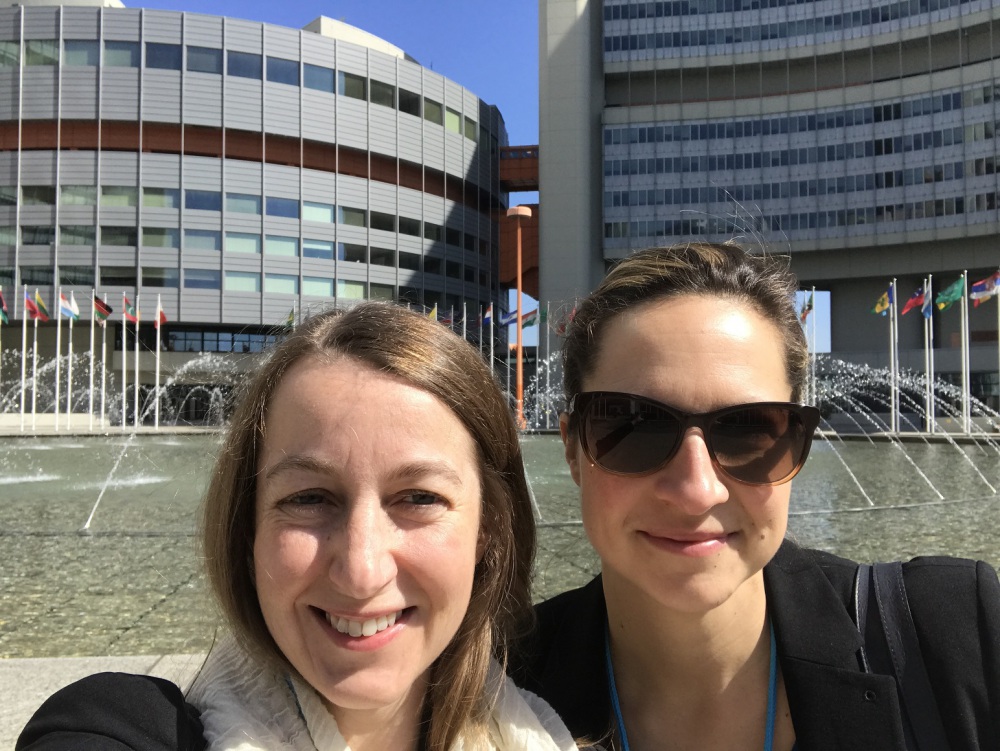
Samantha Neakrase
Senior Director
Atomic Pulse
PrepCom Primer.
Over the past two weeks, delegations from states party to the Treaty
on the Non-proliferation of Nuclear Weapons (NPT) met in Vienna for
the first preparatory committee meeting (PrepCom) of
the 2020 NPT review conference (RevCon) cycle. These meetings are held in each
of the three years prior to the RevCon and, if necessary, the year of the
RevCon itself. Their purpose is to develop a substantive agenda for and plan
the RevCon.
After failure to reach consensus at the 2015 RevCon, the stakes
for 2020 are high and unresolved issues have put the NPT regime under further stress. These include the inability to hold a conference on a WMD-free zone in the
Middle East (WMDFZ) more than 20 years after the 1995 review
conference called for such a zone in exchange for an indefinite extension of
the NPT, and growing frustration that nuclear-weapons states are not living up
to their disarmament commitments under the NPT and in some cases taking actions
that appear to be contrary to that commitment.
The Elephant in the Room. What made this
PrepCom particularly interesting, however, was that it was sandwiched between
two rounds of negotiations on a treaty to prohibit nuclear weapons
being held at the United Nations in New York. The first session was held on
March 27-31 and the second will be held on June 15-July 7. States parties to
the NPT are sharply divided on the utility of such a treaty—nuclear-weapons
states and U.S. allies in NATO countries and the Asia Pacific oppose the ban,
while other non-nuclear-weapons states support it, though with different
visions of what the treaty should cover. With the draft treaty text set to come
out during the week of May 15, the ban treaty was the elephant in the room at
the Vienna International Center, where the PrepCom took place.
Substantive Discussions Take Back Seat to Restraint.
Isabelle Williams and I arrived early in the second week of the PrepCom. Given
the interesting background to this PrepCom, it was unclear how the meeting
would unfold. But despite the obvious tensions that exist among NPT states
parties on key issues and the divisions that have been made even starker by the
ban treaty negotiations, the discussions in the plenary session were relatively
quiet.
That’s not to say there was complete silence on the challenging
issues, however.
· Countries did discuss the Middle East WMD-free
zone (WMDFZ) and Russia put forward a working
paper proposing a plan to move this forward. Several people told me that
there are increasing frustrations among Arab states with Egypt over the issue
(even submitting a separate
working paper on the issue). Meanwhile, one of Egypt’s statements threatened: “Any further delay to
implement the 1995 Resolution could possibly lead, once again, to an
unfavorable outcome of the next Review Conference.”
· Disarmament of course featured strongly in
national statements and reports, including a working paper from Iran linking
the need for progress on disarmament to make progress on non-proliferation
entitled “Nonproliferation in all its aspects.”
· And some countries did refer to the ban treaty
negotiations, including a swipe by Russia that “Many NPT Parties are tempted
to reach complete nuclear disarmament overnight.”
But overall, according to those who had been in the room
throughout the PrepCom, there was no real substantive debate on any of the key
challenges. The most challenging and tense discussions were occurring in
private.
Battles over Consensus
Avoided. The PrepCom ended with the Dutch delegation, which chaired the
2017 PrepCom, issuing a Chairman’s Summary of the conference proceedings rather
than attempting to draft a consensus document. During the final plenary
session, states had the opportunity to comment on the summary. Most states congratulated
the Dutch on the summary and their leadership as Chair, as well as the
transparency and inclusiveness of the process leading up to the PrepCom. Many
states, primarily from the Non-Aligned Movement (especially Brazil), however,
noted that the summary did not sufficiently give recognition to support for
current negotiations on the ban treaty. Other states also emphasized the
failure to convene a conference in the Middle East on a WMDFZ. The Dutch
decided that rather than edit the summary based on comments from states parties
made during the final plenary session, states could submit working documents reflecting
their views.
What does all this mean? The peacefulness of the
proceedings largely reflects the fact that the process has been managed
carefully and effectively by the Dutch government and efforts by some countries
to ensure that the ban treaty did not distract from the PrepCom. (Releasing the
ban treaty text after the PrepCom is part of that strategy.) The U.S. delegation was also participating
without clear positions on several issues beyond North Korea, which impacted
the dynamics of the proceedings. However, the avoidance of discussions on
difficult issues also raises several questions:
· Did the desire to not rock the boat during the
PrepCom risk leaving key challenges that must be addressed prior to the 2020
RevCon to fester beneath the surface? Or did it give more space for countries
to have more productive discussions behind closed doors?
· Was this a lost opportunity for
non-nuclear-weapons states to pressure the P5 on steps (other than a ban) to
advance the disarmament agenda? With the P5 process essentially dormant (not
surprising given U.S.-Russia tensions and the lack of clear policy from the
Trump administration), the P5 is unlikely to come up with fresh ideas on its
own.
Possible Storm Clouds Ahead. Looking forward, as
the Polish government prepares to take over as chair of the 2018 PrepCom, there
are unanswered questions that will likely make its job more difficult:
· What will be the potential impact of a completed
ban treaty, which most people expect will be in place before the 2018 PrepCom? Will
discussions of the ban recede once it is in place and focus shift back to
disarmament steps under the NPT? Or will countries want to focus even more on
ways to implement or strengthen the ban treaty, including the development of
protocols, verification mechanisms, or other follow-on actions? The ban could
still impact not only the 2018 PrepCom, but other venues where disarmament
issues will be addressed over the next year, such as the High-Level FMCT Expert Preparatory Group, the 2018 UN High Level Conference on Nuclear Disarmament,
and the Group of Government Experts that has been tasked
with considering verification issues.
· What will be the outcome of the U.S. nuclear posture
review? Any significant shifts in policy, such as moving away from the goal of
working toward a world free of nuclear weapons, withdrawal from the INF treaty,
or failure to extend New START could have a significant impact on future NPT
debates and action.
· How will developments with North Korea unfold?
Any significant change, either toward addressing or heightening of tensions
would impact the whole NPT agenda.
Although the NPT
waters appear relatively calm, this should not be mistaken for progress.
Significant tensions could still arise, uncertainty over U.S. policy and the
U.S.-Russia bilateral relationship will remain, and the ban treaty could still
detract from focus on the NPT and potentially widen divisions even after a
treaty is concluded.
Sign up for our newsletter to get the latest on nuclear and biological threats.
